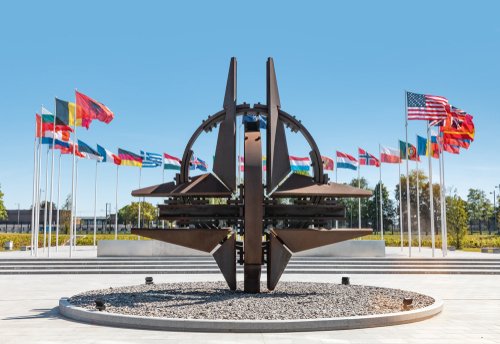Athens (Brussels Morning Newspaper), For centuries, allies, during the existence of the Eastern Roman Empire, fought together and cooperated in the region but also in Anatolia, southern Italy, and the Eastern Mediterranean. Today, after a break in history, Greeks and Macedonians are invited again, within the framework of NATO, to cooperate.
The country’s admission to the Alliance took on global dimensions and the normalization of relations between the two neighbors brought to the fore the debate even to propose the two leaders for the Nobel Peace Prize.
According to the New York Times, the course of North Macedonia toward NATO is a setback for Russia, which has attempted to assert itself after losing sway in Eastern and Central Europe after the fall of Communism. The Kremlin is particularly anxious about the Balkans, which it still regards as part of its historical area of influence.
Within a year the country from part of the Balkans became the center of Southeast Europe and Greece the pillar on which it is based. Under the NATO Air Policing Operation umbrella, the Greek Air Force acquired responsibility for safeguarding North Macedonia’s airspace in November 2021.
Hungary’s Prime Minister Viktor Orbán was the only EU leader to raise doubts about the agreement. He granted political refuge to former Macedonian Prime Minister Nikola Gruevski, who was also the leader of the anti-Prespa VMRO-DPMNE party.
What did both parties gain?
Initially, the two parties gained political legitimacy abroad. In Greece, Alexis Tsipras was considered a pariah and against the West and NATO. The Macedonians, on the other hand, demonstrated that they were ready to take the next step and join the club of Western states. Another Slavic state entering the West sends mixed signals and expresses grave worry outside the Western Bloc. Instead of Washington or Berlin, one should always choose the Kremlin or Beijing.
Athens chose Berlin too, and it is rumored that several financial institutions were very happy about it and eased several funding, redirecting the flow to Southeastern Europe. This decision created a dynamic that is still evident today. Two states willing to take the hard road are politically ripe to contribute to the region when and as they are asked.
At the same time, Turkey does not comply nor does it seem willing to cooperate with the West. Automatically the last stable part of the Alliance, the Strategic Axis is no longer Athens Ankara, it is Athens Skopje. But that is a matter of discussion for another analysis.
A larger award frequently follows. Membership in the military alliance has frequently been linked to membership in the European Union’s political and economic partnership. Countries have undergone considerable adjustments before joining both organizations, a process called as Euro-Atlantic integration.
Greece has been part of the Alliance and the European Union for many years. But what many ignore is that apart from the Security Forces, which also need upgrading from an operational perspective, many of Athens’ government institutions are not of a European standard.
Now the two states become part of the solution and not the problem. And there are many problems in the region involving Albanians and other Slavs, the Serbs. Albania is in NATO and if asked, will have to safeguard or assist its neighbor.
What the future holds
In an agreement, especially between states, both parties will lose something but the prospect of winning is even greater. North Macedonia is not part of the EU, yet. But what did Skopje gain? Greece was a member of both organizations, one could say that it gained nothing. But it would exclude the strategic depth that is already visible a few years later.
Military upgrade for both, with Skopje upgrading their military, deepening their networks, and participating in exercises with the best armies in the world. Greece, by securing the neighboring country’s aerial borders, is being discussed to receive the F-35s. Aircraft that very few states have been able even to pre-order. A purchase that Turkey is eyeing and lobbying for years.
And it’s a lot easier to work with your neighbor than it is to join in missions in another part of the world. Georgia is an ideal example, as its country was fractured and its armed forces were required to participate in missions in Africa, the Middle East, and South Asia.
The Greek and Macedonian forces may have to do the same in the future. But they will have their borders secured, with NATO bases back in their countries. Bases which, in addition to military depth, ensure at an operational or strategic, intelligence level that no private company, of the Wagner type, will develop “economic activity”.




